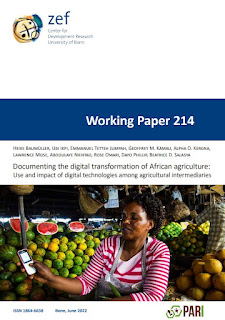ZEF (2022) Documenting the digital transformation of African agriculture:. Use and impact of digital technologies among agricultural intermediaries in Africa. # 44 p.
This study was conducted by a team of researchers from Nigeria, Ghana, Kenya, Mali and Germany. Data was collected through 1,571 in-person interviews with extension workers, output dealers and input dealers in the four African countries.
It is easily the most comprehensive empirical work on the digital transformation of agriculture in Africa that I have thus far come across. The results are very rich. In addition to the three concrete impact areas that the study isolates, I found its findings on digital skills among agricultural intermediaries very very interesting. John KietiThe study shows that intermediaries make extensive use of ICTs in their work, much more so than the low adoption rates of D4Ag solutions would suggest. Mobile phones clearly dominate the digital technologies, most commonly smartphones, which are often used daily. Three areas of impact were identified:
- ICTs facilitate information sharing between intermediaries and other value chain actors which emerged as the main activity and benefit across the three groups.
- ICTs facilitate networking among value chain actors. In the case of dealers, these networks are mainly used for two-way business transactions while extension agents take advantage of ICTs to interact and share information with a wide range of actors.
- ICTs reduce transaction costs for input and output dealers through better access to information about buyers, sellers and prices, better timing of produce / input purchases, faster payments from customers and reduced travel times.
The study is available at https://research4agrinnovation.org/publication/digitalization_intermediaries/.


No comments:
Post a Comment